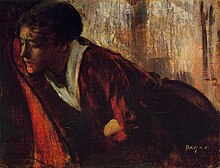This article needs additional citations for verification. (September 2014) |
| Recurrent brief depression | |
|---|---|
| Other names | Periodic melancholia, intermittent depressive disorder |
 | |
| Melancholy by French artist Edgar Degas (1874) | |
| Specialty | Psychiatry, clinical psychology |
| Symptoms | Low mood, anhedonia, impaired function, suicidal ideation, irritability, anxiety, hypersomnia |
| Complications | Hypomania, self-harm, suicide |
| Duration | 2–13 days for 6–12 times per year |
| Differential diagnosis | Major Depressive Disorder, Dysthymia, Bipolar Disorder, Borderline Personality Disorder |
| Treatment | Psychotherapy, psychopharmacology |
| Frequency | ~9% (lifetime risk); 5% (12-month risk) |
Recurrent brief depression (RBD) defines a mental disorder characterized by intermittent depressive episodes, not related to menstrual cycles in women, occurring between approximately 6–12 times per year, over at least one year or more fulfilling the diagnostic criteria for major depressive episodes (DSM-IV and ICD-10) except for duration in which RBD is less than 14 days (typically 5–7 days).[1] Despite the short duration of the depressive episodes, such episodes are severe, and suicidal ideation and impaired function is rather common. The majority of patients with RBD also report symptoms of anxiety and increased irritability. Hypersomnia is also rather frequent. About 1/2 of patients fulfilling diagnostic criteria for RBD may have additional short episodes of brief hypomania, which is a severity marker of RBD. RBD may be the only mental disorder present, however RBD may also occur as part of a history of recurrent major depressive episodes or bipolar disorders. RBD is also seen among some patients with personality disorders.